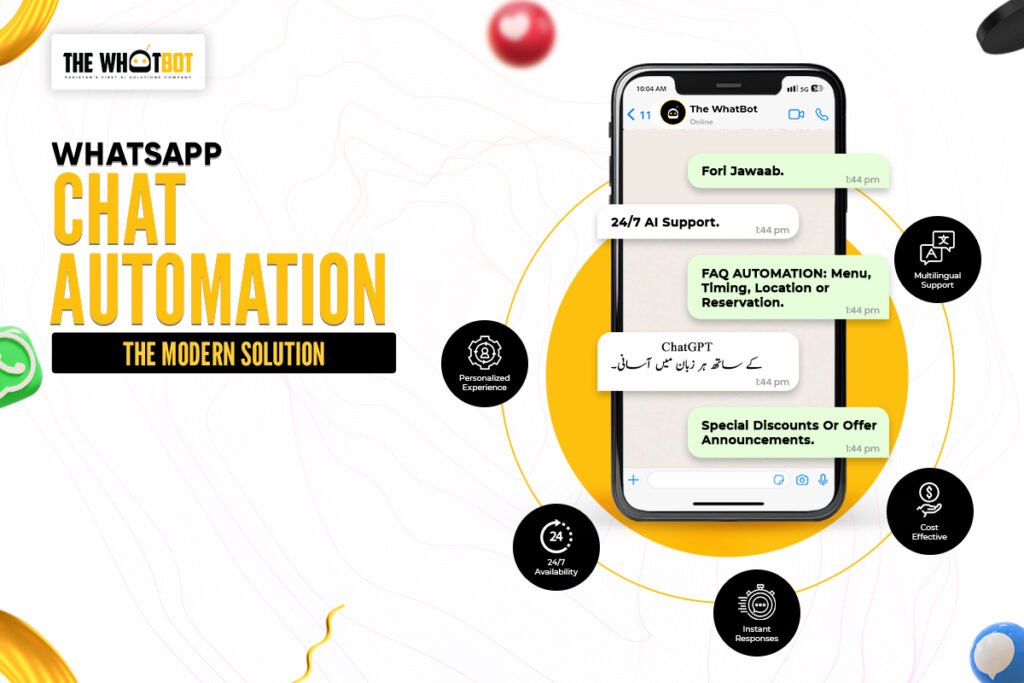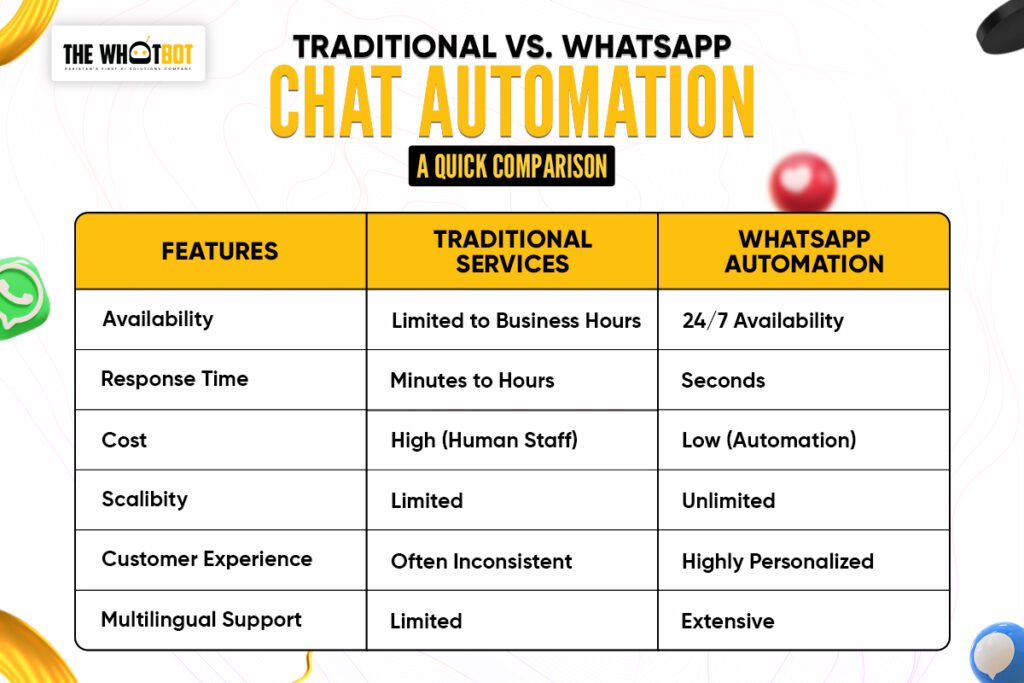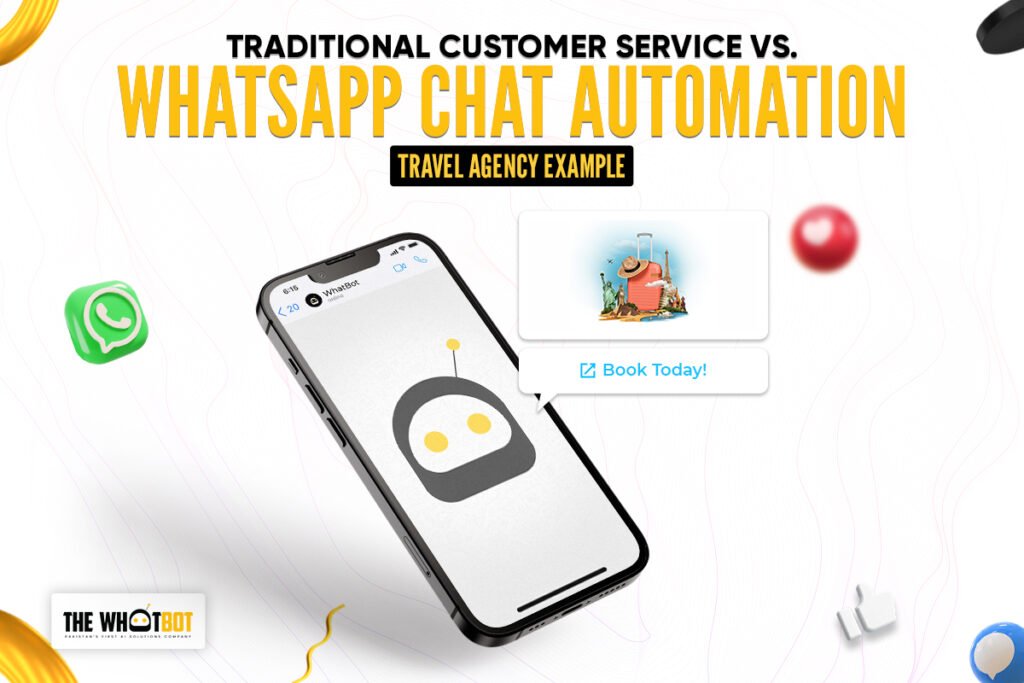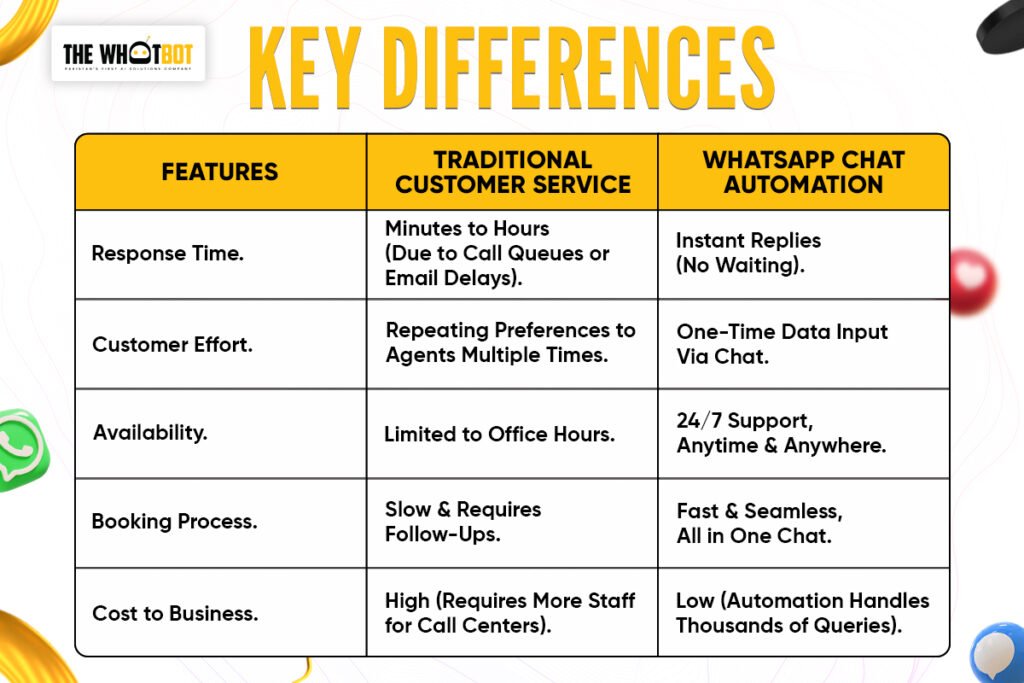Customer service is the backbone of any successful business.. However, traditional methods like phone calls and emails can often be time-consuming and frustrating for both businesses and customers. Enter Pakistan’s first WhatsApp Chat Automation—a powerful Ai-tool that’s transforming the way businesses connect with their customers with its ability to handle queries instantly, provide personalized responses, and operate 24/7.
In this post, we’ll dive into the key differences between WhatsApp Chatbot Automation and traditional customer service, explore why automation is the future, and share real-life examples of how this technology is helping businesses thrive.
Why Traditional Customer Service Is Falling Behind?

- Phone support: Customers dial in and wait (sometimes forever!) to speak to an agent.
- Email support: Often results in delayed responses.
- In-person support: Limited by geography and restricted to business hours.
- Long wait times: Customers dislike being put on hold for extended periods.
- High operational costs: Hiring and training human agents is expensive.
- Limited availability: Traditional services are usually restricted to business hours.
WhatsApp Chat Automation: The Modern Solution

WhatsApp Chat Automation leverages artificial intelligence (AI) and chatbots to handle customer queries instantly. With over 2 billion users on WhatsApp, this platform has become the perfect place for businesses to engage with customers.
Here’s why businesses are switching to WhatsApp Chat Automation:
- 24/7 Availability: Ai Chat Automation never sleep—they’re always ready to assist, even at 2 a.m., unlike traditional customer service limited by business hours.
- Instant Responses: Say goodbye to long wait times! WhatsApp Business API reply within seconds, unlike the dreaded “Your call is important to us” messages.
- Cost-Effective: Handle thousands of queries simultaneously without hiring more staff, saving big on operational costs.
- Personalized Experience: Bots can suggest products or services based on customer preferences and behavior, creating a tailored experience.
- Multilingual Support: Perfect for global businesses, bots can communicate in multiple languages, solving a major limitation of traditional methods.

To give you a clearer picture of how WhatsApp Chat Automation stacks up against traditional customer service, let’s dive into a real-world example involving a travel agency.

Scenario 1: Using Traditional Customer Service
Imagine a customer, Sarah, wants to book a last-minute vacation package to Bali. Here’s how the process might look with traditional customer service:
Step 1: Phone Call or Email Inquiry:
Sarah calls the travel agency’s helpline. After waiting on hold for 15 minutes, she finally gets through to an agent.
Step 2: Gathering Information:
The agent asks her several questions about her travel preferences (dates, budget, activities, etc.). This back-and-forth takes another 10 minutes.
Step 3: Package Options:
The agent emails Sarah the vacation package options. She now has to sift through the options and call back with her decision.
Step 4: Confirmation:
Sarah calls back to confirm her choice, but the agent she spoke with earlier isn’t available. She explains everything again to a new agent, leading to further delays.
Total Time Spent:
About 1-2 hours (including wait time, calls, and email communication).
Scenario 2: Using WhatsApp Chat Automation
Now, let’s see how the process would work if the same travel agency used Chatbot Automation:
Step 1: Instant Message
Sarah sends a message to the travel agency’s WhatsApp Business number, typing something like:
“Hi, I’m looking for a vacation package to Bali. Can you help?”
The WhatsApp bot instantly replies with a friendly message:
“Hi Sarah! We’d love to help you plan your trip to Bali. Can you share your travel dates, budget, and preferences (e.g., adventure, relaxation, or sightseeing)?”
Step 2: Automatic Data Collection
Sarah replies with her preferences, and the bot quickly generates a list of vacation packages tailored to her needs. It also includes links to detailed itineraries, prices, and customer reviews.
Step 3: Booking Made Easy
Sarah selects her preferred package by simply typing, “Option 2,” and the bot confirms availability. It then guides her to a secure payment link to complete the booking.
Step 4: Instant Confirmation
After payment, the bot sends a confirmation message with her booking details, flight tickets, and even tips for traveling to Bali.
Total Time Spent:
About 5-10 minutes (entire process completed within WhatsApp).

Conclusion:
When comparing WhatsApp Chat Automation with traditional customer service, the benefits of automation are crystal clear. With 24/7 availability, instant responses, cost efficiency, and personalized experiences, WhatsApp bots are revolutionizing how businesses engage with customers. Traditional methods, while still valuable for complex scenarios, can’t compete with the speed and scalability of automation. For businesses like travel agencies, automation simplifies processes, saves time, and enhances customer satisfaction. Embracing WhatsApp Chat Automation in Pakistan isn’t just a smart move—it’s the future of customer service

